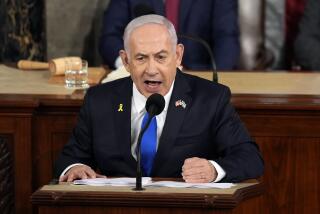Defiant Arafat Vows Not to ‘Kneel’ to Israel
- Share via
JERUSALEM — As U.S. special envoy Dennis B. Ross arrived in Israel on Saturday for talks aimed at pressing Yasser Arafat to crack down on Islamic militants, the Palestinian Authority president again said he will not agree to Israeli demands for “mass arrests.”
In an angry, at times defiant, speech to the Palestinian Legislative Council, Arafat accused Israeli Prime Minister Benjamin Netanyahu of waging “state terrorism” with sanctions against the Palestinians as punishment for a double suicide bombing that killed 13 Israelis in downtown Jerusalem.
“We are committed to peace, the peace of the brave, but not to the peace of dictation, orders, starvation, humiliation and siege,” Arafat told the legislators meeting in emergency session in the West Bank city of Ramallah. “Our people will not kneel.”
The speech, another in a string of verbal attacks launched by both Israeli and Palestinian leaders in the wake of the July 30 bombing, came hours before Ross’ arrival on a visit aimed at defusing the crisis. It underlined just how difficult the American’s task will be.
The primary focus of Ross’ visit, his first to the region since June, will be to try to get the Palestinian Authority to respond to Israeli demands for more sweeping action against militant groups.
Secretary of State Madeleine Albright has said she will make her first official visit to the region at the end of August if Ross succeeds in persuading Arafat to take concrete steps against the groups, apparently including the arrest of leaders and the confiscation of weapons caches.
But U.S. officials in Jerusalem said Arafat’s angry words will not help Ross in his effort to smooth the badly damaged relations between the two sides and restore a measure of trust. “It’s not good,” one said. Ross is scheduled to meet today with Netanyahu in Jerusalem and with Arafat at his Gaza Strip headquarters.
Israel responded to the July bombing with the harshest sanctions it has ever imposed on the Palestinian self-rule government. It cut the flow of tax revenue it is required to transfer to the Palestinians, suspended all peace negotiations and imposed internal and external closures on the Palestinian territories.
The United States and others in the international community have appealed to the Netanyahu government to soften its hard line and pay what it owes the Palestinians under terms of existing peace agreements. Otherwise, they warn, Israel risks weakening Arafat’s political position, perhaps beyond repair. But apart from minor easings of the sanctions, Israel has declined to heed that advice.
On Saturday, the government announced that its closure will be lifted slightly today to allow residents of Janin, Tulkarm and Kalqilya to travel outside their West Bank communities for the first time since the bombing. But Ramallah, Bethlehem and Hebron are still closed off, and virtually all Palestinians from the West Bank and Gaza Strip are forbidden to enter Israel.
In his speech, besides castigating Israel for its severe measures against the Palestinian Authority, Arafat said that in several meetings since the bombing, Israeli security officials have told their Palestinian counterparts that the two men who carried out the Jerusalem attack came from abroad, not from the Palestinian-ruled areas.
Netanyahu aide David Bar-Illan denied the claim. “We did nothing of the sort,” he said. “The working supposition is still that [the bombers] came from the territories under Palestinian control.” But he said that the origination point should make no difference: “The infrastructure for terrorism still exists inside the Palestinian areas and should be stamped out.”
Bar-Illan also criticized the Palestinian legislature for voting unanimously Saturday to begin drafting a military conscription law that would require young Palestinians to perform “military and public service” for at least six months. The Israeli official said the law would be a violation of existing agreements, which allow the Palestinians to establish security forces but not an army.
Arafat said Israel has demanded that he arrest 188 suspected members of Hamas and Islamic Jihad, militant Islamic groups responsible for previous attacks against Israel. Hamas has claimed responsibility for the Jerusalem attack. “We have our law, and we implement it,” Arafat said. “But we do not get orders from the Israelis.”
In the course of his comments, the Palestinian leader praised Albright’s statement last week that Middle East peace should be based on the formula of land for peace, the idea that provides the underpinning for all agreements between Israelis and Arabs.
But other members of his government, speaking privately, have charged that the United States, by emphasizing that its current mediation effort will focus solely on security, has shown a bias toward Israel. In the talks today, the Palestinians are expected to try to obtain U.S. assistance in pressuring Israel to lift the sanctions.
Ross’ visit also comes at a time of escalating tensions along Israel’s border with Lebanon. On Saturday, Israeli military planes attacked a base in eastern Lebanon that is used by the Iranian-backed Lebanese militia Hezbollah.
The raid, the latest of several by Israel in recent days, continued the worst upsurge in cross-border violence in more than a year.
Saida Hamad of The Times’ Jerusalem Bureau contributed to this report from Ramallah.
More to Read
Get the L.A. Times Politics newsletter
Deeply reported insights into legislation, politics and policy from Sacramento, Washington and beyond. In your inbox twice per week.
You may occasionally receive promotional content from the Los Angeles Times.










